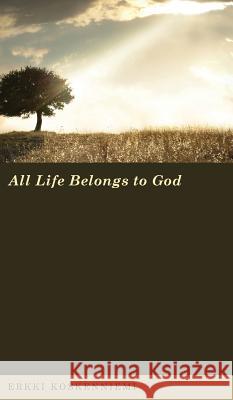All Life Belongs to God » książka
All Life Belongs to God
ISBN-13: 9781498262057 / Angielski / Twarda / 2012 / 74 str.
All Life Belongs to God
ISBN-13: 9781498262057 / Angielski / Twarda / 2012 / 74 str.
(netto: 119,46 VAT: 5%)
Najniższa cena z 30 dni: 125,09
ok. 16-18 dni roboczych
Dostawa w 2026 r.
Darmowa dostawa!
Description: The Greeks and Romans often exposed their babies, especially if the child was of the wrong gender, malformed or from the wrong father--or, more simply, when a child was not needed. It was lawful, but Jewish and then Christian teachers did everything to prevent the practice among their own groups. Most of the arguments used by Christians were borrowed from their Jewish predecessors. The unique value of every human being and God's commandments were emphasized in both religions. Above all, they considered a newborn child a person who was created and protected by her or his Creator. The book presents the most important texts, often dealing simultaneously with exposure and abortion. The texts are interesting, sometimes shocking. A world without Christian ethics could be very hard for a small child. The book helps every modern reader to take care that our societies treat gentler human lives in their earliest phases. Endorsements: ""In contrast to the antique Greek and Roman practice the Jewish and the Christian religion strictly forbade the killing of unborn and newly born children. This profound book by Erkki Koskenniemi shows the reasons for this new view, and it seems that it is very urgent to accept the dignity of human life today, born or unborn, in order to offer a humane future for us all "" --Josef Spindelbock University of St. Polten Austria ""Contrasting the ancient Greco-Roman view of exposure with that of the Jewish-Christian world, the author presents a powerful case for the claim that all human life is sacred to God. This deeply erudite yet highly accessible volume is a vital theological contribution, with contemporary implications reaching far beyond the question of exposure itself."" --Thomas G. Guarino Seton Hall University New Jersey, United States About the Contributor(s): Erkki Koskenniemi is Assistant Professor of New Testament at the Universities of Helsinki and Eastern Finland (Joensuu) and at Abo Akademi University (Turku), Finland. He is the author of several scholarly books, especially on miracles in Classical Antiquity and Early Judaism."
Description:The Greeks and Romans often exposed their babies, especially if the child was of the wrong gender, malformed or from the wrong father--or, more simply, when a child was not needed. It was lawful, but Jewish and then Christian teachers did everything to prevent the practice among their own groups. Most of the arguments used by Christians were borrowed from their Jewish predecessors. The unique value of every human being and Gods commandments were emphasized in both religions. Above all, they considered a newborn child a person who was created and protected by her or his Creator.The book presents the most important texts, often dealing simultaneously with exposure and abortion. The texts are interesting, sometimes shocking. A world without Christian ethics could be very hard for a small child. The book helps every modern reader to take care that our societies treat gentler human lives in their earliest phases.Endorsements:""In contrast to the antique Greek and Roman practice the Jewish and the Christian religion strictly forbade the killing of unborn and newly born children. This profound book by Erkki Koskenniemi shows the reasons for this new view, and it seems that it is very urgent to accept the dignity of human life today, born or unborn, in order to offer a humane future for us all!""--Josef SpindelböckUniversity of St. PöltenAustria""Contrasting the ancient Greco-Roman view of exposure with that of the Jewish-Christian world, the author presents a powerful case for the claim that all human life is sacred to God. This deeply erudite yet highly accessible volume is a vital theological contribution, with contemporary implications reaching far beyond the question of exposure itself.""--Thomas G. GuarinoSeton Hall UniversityNew Jersey, United StatesAbout the Contributor(s):Erkki Koskenniemi is Assistant Professor of New Testament at the Universities of Helsinki and Eastern Finland (Joensuu) and at Åbo Akademi University (Turku), Finland. He is the author of several scholarly books, especially on miracles in Classical Antiquity and Early Judaism.











